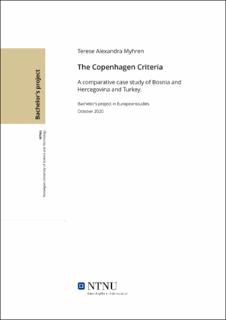| dc.contributor.advisor | Fedorchak, Viktoriya | |
| dc.contributor.author | Myhren, Terese Alexandra | |
| dc.date.accessioned | 2021-09-13T16:07:38Z | |
| dc.date.available | 2021-09-13T16:07:38Z | |
| dc.date.issued | 2021 | |
| dc.identifier | no.ntnu:inspera:80491188:37351004 | |
| dc.identifier.uri | https://hdl.handle.net/11250/2775709 | |
| dc.description.abstract | I denne case- studien vil de to landene Tyrkia og Bosnia analyseres fra perspektivet, historisk institusjonalisme. De to landene som analyseres er kategorisert forskjellig av EU, Tyrkia er kategorisert som «kandidat» og Bosnia er kategorisert som en «potensiell kandidat». Case- studien vil undersøke hvor mye denne kategoriseringen virkelig forteller om hvor nære de respektive landene er å bli fullverdige EU medlemmer. Igjennom å analysere de to landene, vil vi lære hvor lite kategoriseringen virkelig forteller om den sanne politiske situasjonen i et land, samt at å se på kategoriseringen av et land ikke kan fortelle hvor rasket et land vil få statusen som EU land.
Fokset til denne analysen er å undersøke hvordan historiske hendelser og historie is seg selv, har formet institusjoner og det institusjonelle rammeverket i de to respektive landene samt hvordan dette har påvirket integrasjons prosessen deres. Den politiske delen av Københavnskriterine, som er de laveste kriteriene et land må møte for at medlemsforhandlingene kan begynne, er hovedfokuset i denne analysen. Hvordan historiske hendelser har formet institusjoner og deres evne til å garantere menneskerettigheter samt respekt for minoriteter og sikre rettssikkerhet. Analysen vil avsløre viktigheten av historie og historiske hendelser når det kommer til utformingen av institusjoner, samt hvor vanskelig det kan være å reformere institusjoner slik at de møter kravene og politikken i EU. | |
| dc.description.abstract | In this case study the two countries Turkey and Bosnia are being analyzed from the perspective of historical institutionalism. The research question of this dissertation is: What separates candidate country Turkey and potential candidate Bosnia? These two countries are categorized differently by the EU, Turkey being a “candidate” and Bosnia a “potential candidate”. The case study will analyze how much this categorization really reveals about how close the respective countries are to reaching the statues of EU member states. Throughout the analysis we learn how little the categorization tells us about the true political situation in a country and that it is not a way of telling how rapidly a state will become a EU member state.
The focus of the analysis is how historical events, and history itself has formed the institutions and the institutional framework of the two respective countries and in turn how this has affected their integration process. The political part of the Copenhagen criteria, being the minimum criteria to open accessions with a country, servs as a focal point for this analysis. How historical events have shaped the institutions and their capability to guarantee human rights and respect minorities as well as securing the rule of law. This analysis will reveal how important history and historical events are when it comes to shaping institutions, as well as how difficult it can be to reform institutions, so they become more in line with EU criteria and policy. | |
| dc.language | eng | |
| dc.publisher | NTNU | |
| dc.title | The Copenhagen Criteria - a comparative case study of Bosnia and Hercegovina and Turkey. | |
| dc.type | Bachelor thesis | |
